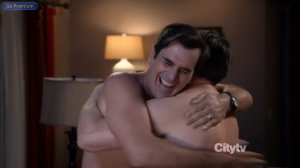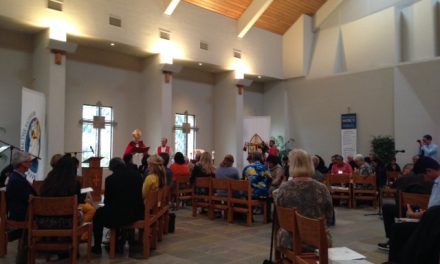 My husband and I are big Modern Family fans, which we gleefully watch on Hulu after the baby goes to sleep. One of the things we love about the show is its family values–the show has three different families, only one of which is “traditional,” and yet it consistently promotes a pro-family message. Even though one of the main families is a gay couple raising an adopted daughter, the show has been surprisingly uncontroversial, even among pro-family conservatives like Mitt Romney, who admitted that it was one of his favorite shows.
My husband and I are big Modern Family fans, which we gleefully watch on Hulu after the baby goes to sleep. One of the things we love about the show is its family values–the show has three different families, only one of which is “traditional,” and yet it consistently promotes a pro-family message. Even though one of the main families is a gay couple raising an adopted daughter, the show has been surprisingly uncontroversial, even among pro-family conservatives like Mitt Romney, who admitted that it was one of his favorite shows.
A recent episode has changed that for my family. Episode 8 on Season 4 entitled “Mistery Date” features Phil with the house to himself for a weekend. At the gym, he meets a guy who went to the same college as him, and Phil invites him to the house for a “man’s night.” The guy, Dave (played by Matthew Broderick), happens to be gay, unbeknownst to Phil, and is just getting out of a bad break-up. Phil’s oblivious friendliness looks to Dave an awful lot like flirting, and it is clear that both men have very different expectations for what is going to happen at the “man’s night.” In the meantime, Dave keeps calling Cam, one of the show’s main characters who also gay but who is in a long and committed relationship, for advice on how the evening should proceed.
So far, the show is okay. The plot is a bit predictable as hijinks are sure to ensue when Dave finds out that Phil is not gay, but a happily married man. However, the show takes an unexpected turn when he arrives at Phil’s house and sees the pictures of his wife and kids.
Dave: “Wait a minute. Is that your family? Are you married?”
Phil: “Yeah, but don’t worry. We have the house to ourselves. They’re all out of town. I’m long overdue for a boys’ night.”
Dave: “So your wife is OK with it?”
Phil: “Oh, yeah. She suggested it. She knows I need this every so often. As long as I clean up afterwards, she’s fine.”
Phil means a man’s night of watching football; Dave takes it as a night of hooking-up. He calls Cam for advice, reluctant to stay and flirt with a married man. Cam, who doesn’t know that it is Phil his friend is hoping to hook up with, tells him not to worry. As long as the wife is cool with it, hooking up for a night shouldn’t be a problem. Besides, Dave, who is on the rebound, needs this.
There are a whole host of moral problems with this plot line. The first is that Cam is encouraging his friend Dave to have sex with a man whom he just met. Not to undermine this problem, but it is Hollywood where people seem to always fall into bed on the first date.
The second problem is that Cam seems to be encouraging his friend Dave to commit adultery–to have sex with a married man. This is a much more complex problem. On the one hand, it implicitly promotes a stereotype of gay men as being more promiscuous and less committed to monogamy than their heterosexual counterparts. Would the show have gotten away with Phil encouraging a straight friend of his to sleep with another man’s wife? I don’t think so. The show seems to think that because Dave is gay and because he thinks Phil is too, sleeping with him shouldn’t be a problem. If I were a gay man, however, I would be quite upset that Cam, who is himself in a committed marriage, succumbed to this stereotype.
Another way of making sense of the adultery plot line is that it is not so much about adultery as it is about sexual fulfillment. The show makes clear (from the dialogue above) that Phil’s wife is “okay with it.” The assumption Dave is working with is that Phil is a gay man in a married heterosexual relationship, and that his wife is okay with the occasional homosexual fling. On this reading, Dave is not really committing adultery with Phil because his wife has consented to it. Theirs is a marriage that plays by different rules. So Cam is not so much encouraging his friend to have an affair as he is encouraging his friend to embrace that some marriages are not exclusive.
This is still very problematic. First, because it makes exclusivity accidental to the marital relationship. Paul VI writes in Humanae Vitae about this importance of faithfulness in the marital bond:
Married love is also faithful and exclusive of all other, and this until death. This is how husband and wife understood it on the day on which, fully aware of what they were doing, they freely vowed themselves to one another in marriage. Though this fidelity of husband and wife sometimes presents difficulties, no one has the right to assert that it is impossible; it is, on the contrary, always honorable and meritorious (9).
Whatever way in which the “modern family” might evolve, it cannot fail to be faithful and exclusive. Sexual orientation should not change the importance of faithfulness in marriage.
The second problem that I can see with this explanation of the plot line is that it assumes that individuals should do whatever necessary to fulfill their sexual desires. Dave needs a sexual relationship to help him “bounce back” from the break-up he just experienced, and Cam makes it clear that if he can be fulfilled with this man (Phil) whom he just met and who is married with kids, he should go for it. Dave is assuming also that Phil needs the occasional fling with a man to be fulfilled sexually. The show makes it clear that sexual desire is not something that can or should be controlled. Again, it is unfortunate that the show correlates this message with its gay characters. In doing so, it implicitly promotes the stereotype that gay sexual desire is contrary to marital fidelity. I don’t think the show would let Jay (who is straight) have an occasional sexual fling with his ex-wife, even with his wife Gloria’s consent, just because he needs a certain level of sexual fulfillment.
In a show like Modern Family, you expect sex to come up. Not too long ago, the show dealt with Haley, who is 18, having sex with her boyfriend. I thought the show dealt with this issue carefully, and in the end, it still affirmed a “pro-family” message, namely, that Phil and his wife Claire continue to support Haley even though they disagree with her decision. The show “Mistery Date,” for the first time I can remember, openly endorsed values that are contrary to the well-being of the “modern family.” Not only that, but the show has undermined one of its main moral messages, namely that homosexuals are not a threat to the modern family. “Mistery Date” resorts to homosexual stereotypes for a couple of cheap laughs. It would have been much better if Cam had dissuaded Dave from pursuing a married man. It would have been much more in line with Cam’s character and with the character of the show.




I agree with much of what you say, but it seems to me that Catholic moral theology cannot understand sex between two men (one or both of whom are heterosexually marred) or two women (one or both of whom are heterosexually married) to be adultery.
If mutual self-giving through heterosexual intercourse is the only way for a man and a woman to join in marriage (“conjugal marriage,” as Girgis, George, and Anderson describe it), only heterosexual intercourse outside that marriage can constitute adultery. If the Catholic Church insists that same-sex couples cannot marry, it also must be acknowledged that they cannot (even if one or both of them is in a heterosexual marriage) commit adultery. They can be guilty of any number of wrongful acts, but adultery can’t be one of them.
Of course, from the viewpoint of Catholicism, Cam and Mitchell are in an immoral relationship, and they are “doing violence” to Lily:
I agree that Cam’s advice to Dave was wrong. But if Cam were to consult Catholic moral theology, he’d find out that his most cherished relationships are immoral. And while, according to Catholic morality, it would have been wrong for Dave and Phil to engage in any kind of sexual activity under those particular circumstances, it would be wrong of them to engage in any kind of sexual activity under any circumstances whatsoever. Why should Cam be concerned with what Pope Paul VI had to say about marital fidelity? Gay people (as opposed to closeted, celibate “homosexual persons”) cannot look to the Catholic Church for guidance in sexual morality.